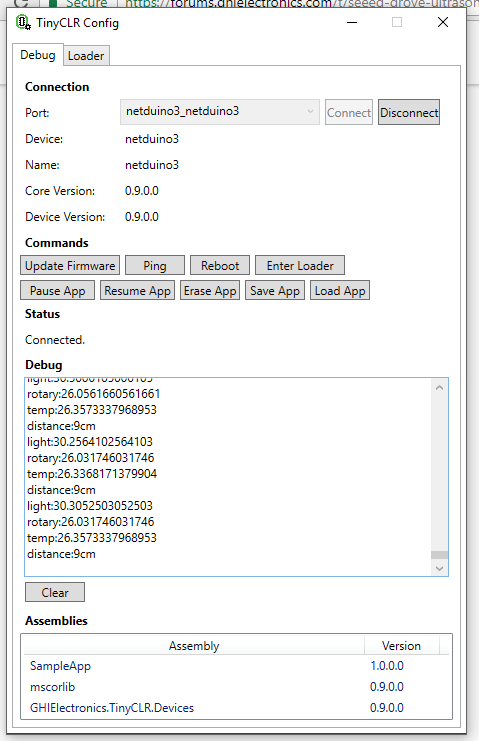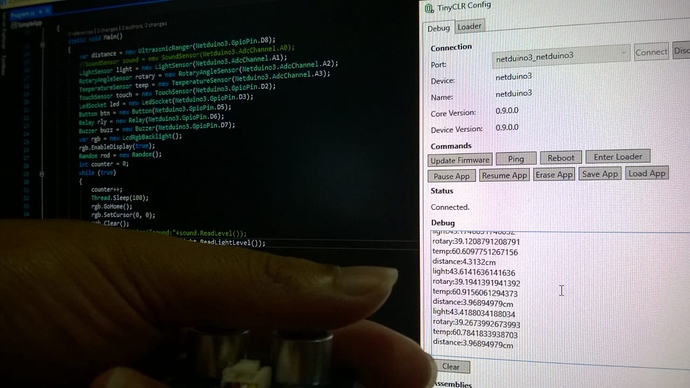I have ultrasonic ranger sensor from Seeed (Grove - Ultrasonic Ranger - Seeed Wiki) and I have ported it’s driver to C# (TinyCLR). Here is my code:
public class DistanceSensor
{
public GpioPin _pin { get; set; }
static long MicrosDiff(long begin, long end)
{
return end - begin;
}
static long micros()
{
var ticks = DateTime.Now.Ticks;
long microseconds = ticks / (TimeSpan.TicksPerMillisecond / 1000);
return microseconds;
}
long pulseIn(bool state, long timeout = 1000000)
{
var begin = micros();
// wait for any previous pulse to end
while (_pin.Read() == GpioPinValue.High) if (MicrosDiff(begin, micros()) >= timeout) return 0;
// wait for the pulse to start
while (!(_pin.Read() == GpioPinValue.High)) if (MicrosDiff(begin, micros()) >= timeout) return 0;
var pulseBegin = micros();
// wait for the pulse to stop
while (_pin.Read() == GpioPinValue.High) if (MicrosDiff(begin, micros()) >= timeout) return 0;
var pulseEnd = micros();
return MicrosDiff(pulseBegin, pulseEnd);
}
public DistanceSensor(int SignalPin)
{
_pin = GpioController.GetDefault().OpenPin(SignalPin);
}
/*The measured distance from the range 0 to 400 Centimeters*/
public long MeasureInCentimeters()
{
//pinMode(_pin, OUTPUT);
_pin.SetDriveMode(GpioPinDriveMode.Output);
_pin.Write(GpioPinValue.Low);
Thread.Sleep(2);
_pin.Write(GpioPinValue.High);
//digitalWrite(_pin, HIGH);
Thread.Sleep(5);
_pin.Write(GpioPinValue.Low);
//digitalWrite(_pin, LOW);
_pin.SetDriveMode(GpioPinDriveMode.Input);
//pinMode(_pin, INPUT);
long duration;
duration = pulseIn(true);
long RangeInCentimeters;
RangeInCentimeters = duration / 29 / 2;
return RangeInCentimeters;
}
/*The measured distance from the range 0 to 157 Inches*/
public long MeasureInInches()
{
_pin.SetDriveMode(GpioPinDriveMode.Output);
//pinMode(_pin, OUTPUT);
_pin.Write(GpioPinValue.Low);
//digitalWrite(_pin, LOW);
Thread.Sleep(2);
//delayMicroseconds(2);
_pin.Write(GpioPinValue.High);
//digitalWrite(_pin, HIGH);
Thread.Sleep(5);
//delayMicroseconds(5);
_pin.Write(GpioPinValue.Low);
//digitalWrite(_pin, LOW);
_pin.SetDriveMode(GpioPinDriveMode.Input);
//pinMode(_pin, INPUT);
long duration;
duration = pulseIn(true);
long RangeInInches;
RangeInInches = duration / 74 / 2;
return RangeInInches;
}
}
it’s working, but I think I need to adjust my code to get more accurate reading. suggestion ?

